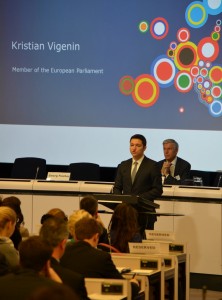 Speech of Mr Kristian Vigenin
Speech of Mr Kristian Vigenin
Rapporteur of the European parliament for IPA
IPA conference, 25 January in Brussels
Excellencies,
Dear colleagues,
Distinguished guests,
It is my pleasure and honor to welcome you today to this conference dedicated to the new Instrument for Pre-accession Assistance.
First of all let me thank the European Commission for hosting us today and congratulate especially DG Enlargement on this timely initiative. As negotiations are advancing both on the new EU External Financing Instruments and the Common Implementing Regulation I fully share the opinion of the Commission that we need to reflect on progress and discuss the IPA framework in more depth.
Furthermore, I would like to welcome the personal engagement of Commissioner Fule in providing an even more sound and effective legal framework and financial instrument to support the Enlargement policy.
I am glad to see such a wide range of stakeholders today ready to debate and exchange views with the European institutions on the future setup of IPA. Having the privilege to be the Rapporteur of the European parliament for IPA and from the perspective of the Parliament in general I welcome this inclusive approach and thank you all for coming.
As you are aware, Parliament and Council, with the help of the Commission, are still negotiating the new IPA Regulation which will enter into force from 2014. The views and intentions of the 3 institutions largely go into the same direction and progress has been achieved. While inter-institutional disagreement continues to prevail on what procedure to apply when adopting the strategic programming documents and to which extent to accommodate the prerogatives of the Parliament, I myself as the Rapporteur for IPA believe that the focus on substance with regard to IPA and Enlargement needs to be maintained. However, I also wish to stress the need to recognize and respect the new legal and political realities stemming from the provisions of the Lisbon Treaty and find a way forward. Only then could we keep the ambitious schedule proposed by the Commission in its planning and programming Roadmap.
Having said that, let me share with you some issues in substance which the Parliament feels strong about and intends to uphold:
1. We welcome the Commission’s proposal that assistance will no longer differentiate between candidate countries and potential candidates as is the case now with the current Component structure, but take due account of the needs and capacities of each country in order to indentify the appropriate mix of policy areas instead. We strongly oppose the inclusion of the stage reached in the formal accession process as a criterion for the initial financial allocations or as a criterion for additional rewards.
2. Strong involvement of civil society and parliamentary scrutiny over the EU agenda. The Parliament is of the view that an inclusive approach should be adopted when implementing reforms in the respective countries. A national consensus, as broad as possible, is an additional driver for change in a society which can ensure both the successful implementation of the reforms and their sustainability. It would also prevent the use of EU agenda for a political bargaining chip ahead of elections. We do not wish to see politicians playing the nationalistic card to attract votes at the expense of the European future of the country.
3. The principle of conditionality. We support the Commission in its effort to ensure that each country is judged on its own merits. Let me be clear on this – no presents will be given and only those who deliver on their commitments will be able to advance on the path towards EU accession. However, it is our view that the assessment of progress achieved should be done on the basis of clear, transparent and measurable qualitative and quantitative indicators to ensure maximum fairness and transparency.
4. A performance incentive. Needless to mention, the formal status or stage in the accession process should not be a goal in itself. What really matters is the actual progress achieved towards meeting the objectives set and its sustainability. It is efforts and progress which will be measured, judged and rewarded. The Parliament is of the view that those who do well in reforms, should get an additional financial stimulus or a reward to be used to finance further reforms and actions. We work closely with the Council and the Commission to develop this idea and ensure its proper functioning.
5. Visibility. Much as we trust the Commission in spending EU tax payers’ money well, we in the European Parliament believe that more efforts are needed to communicate the results achieved by the Enlargement policy and IPA in particular – both in the Enlargement countries and in the EU Member states. Public support is indeed a crucial element of the credibility of the policy we all strive to maintain. Moreover, consistency and complementarity with financing coming from other donors needs to be ensured to create synergies and avoid duplications. We expect the Commission to step up its efforts and take its responsibility in this regard, as the Parliament will step up its role in holding it accountable for the tax payers’ money spent.
I need to underline here that there are also some basic overarching principles which the European Parliament as a Budgetary Authority upholds throughout its work such astransparency, accountability, predictability, flexibility, and efficiency. We have the uneasy task of ensuring them all together at the same time. This is about striking the right balance between them while ensuring that flexibility does not come at the expense of accountability and predictability, for instance. Here I must give credit to the Council and Commission for doing their best to help us strike this right balance.
I believe these principles are widely shared between the institutions and during the course of our negotiations so far we have succeeded to enshrine them in the basic text and provide for a clear vision on Enlargement – a vision based on the values and principles which have inspired the very creation of our Union, on the overall political framework defined by the European Council, and on clear, transparent and measurable specific objectives set before the Enlargement countries.
The Commission presents today a number of important documents related to IPA – an outline of the Rules of Application and the indicative structures of the Common Strategic Framework and the Country Strategy Papers. While they give a goodinitial overview of the future setup of the Instrument, they will of course need to take account of the outcome of the negotiations on the IPA Regulation and the Common Implementing Rules Regulation as primary reference points. In this exercise, we expect the Commission to build on the lessons learned from the previous programming periods and also to take account of the latest developments within the EU itself. IPA planning and programming also needs to be tailored to the needs and capacities of each country.
What’s more, there needs to be a broad agreement and a joint effort by all stakeholders within the respective countries to pursue the objectives set in the country-specific strategy papers.
Therefore, I appeal to you all to take active part in the discussions on IPA not only today but throughout the whole process of planning and programming. I believe it is only by a joint effort that we can set IPA on the right track so that it continues to facilitate a credible and successful Enlargement policy. Enlargement policy has indeed been one of the most successful EU policies so far and we trust it to continue to be a driver for change in the Enlargement countries as well as a source of good results and good news, especially in times when Europe is in desperate need of good news.
Finally, let me pass a message to the representatives of the Enlargement countries present here today. While IPA assists your countries with a view of Union membership, do not do anything simply for the EU institutions. Whatever you do, do it for your country and for your citizens. On our part, we will do our best to support you in this effort.
I look forward to fruitful and constructive discussions today on the future setup of IPA. I believe they will provide a valuable input both for the current negotiations on the Regulation and for the upcoming work of the Commission on the IPA planning and programming documents.
Thank you for your attention, and I wish you a successful day.
